Rugby World Cup History: A Look Back Part 1
Rugby World Cup History: A Look Back Part 1
A look back at the Rugby World Cup from 1987 to 1999
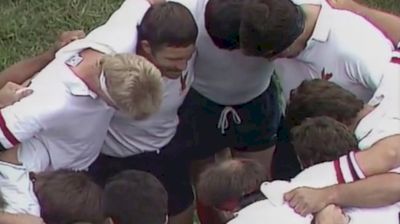
It is odd looking back to imagine that anyone ever thought a Rugby World Cup was a bad idea. But they did.
In a meeting of the International Rugby Board in 1984, both Scotland and Ireland voted against the idea while the English and Welsh each cast one vote in favor and one against, a precursor perhaps to the division which has marked Brexit.
Fortunately, Australia, New Zealand, France, and South Africa—who were members of the IRB in spite of the apartheid-induced international sporting sanction—all voted in favor and the idea was born.
1987
Hosts: New Zealand, Australia
Final: New Zealand 29 France 9 (Eden Park, Auckland)
Third: Wales 22 Australia 21
Sixteen teams were invited to the inaugural event to play for the Webb Ellis Cup, named after William Webb Ellis, the Rugby schoolboy who, according to popular legend, first picked up the ball and ran during a game of football in 1823.
The most memorable match of the tournament saw a flying Serge Blanco sink Australia in the dying moments of the semi-final but Blanco’s France was no match for hosts New Zealand in the final in Auckland, David Kirk’s side gliding to a comfortable victory. The unofficial world champions now had it in the shape of a cup.
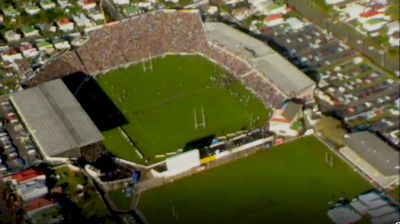
USA: The Eagles were invited to this tournament and defeated Japan 21-18 in the opening game for both teams. Ray Nelson, Mike Purcell, and Gary Lambert scored tries in that game. After that, a creditable loss to Australia and another loss, this time to England, showed the USA to be competitive, but chasing the top teams.
1991
Hosts: England, Wales, Scotland, Ireland, France
Final: England 6 Australia 12 (Twickenham)
Third: New Zealand 13 Scotland 6
The Home Nations quickly dropped their disregard for a World Cup when they were charged with organizing the second edition. Spread across the then Five Nations, the tournament again had 16 teams although this time there had been qualifying, which had led to the arrival of Western Samoa.
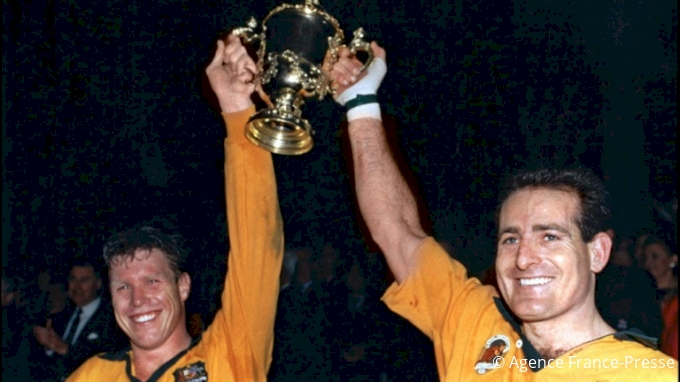
The Pacific Islanders produced one of the biggest rugby shocks ever when they beat Wales in Cardiff. England edged Scotland in a nailbiter of a semifinal—Gavin Hastings still has nightmares over the penalty he missed in front of the posts—but Will Carling’s team were then unsettled by comments by Australia wing David Campese in the leadup to the final and were duly outsmarted by the Wallabies at Twickenham. The Webb Ellis Cup returned down under.
USA: This was a very rough tournament for the USA team. Despite carrying some very talented players, the Eagles were beaten well by New Zealand and England, two of the top three teams in the tournament, and lost to Italy, as well. There was more work to do.
1995
Hosts: South Africa
Final: South Africa 15 New Zealand 12 (aet) (Ellis Park, Johannesburg)
Third: France 19 England 9
South Africa had been banned from the first two editions but with apartheid gone and Nelson Mandela installed as the country’s first black president, they were permitted not just to play in the 1995 World Cup but to host it—the last in the amateur era.
They did an excellent job, showing off the advantages of a single-nation tournament. Mandela and the nation got behind the hosts who duly battled their way through a controversial rain-hit semi-final against France in Durban to reach the final. There they met the Jonah Lomu-fuelled All Blacks.
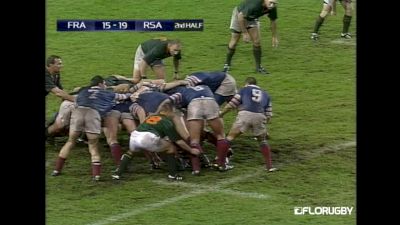
With Mandela wearing the number 6 shirt of Bok skipper Francois Pienaar, and a number of the All Blacks suffering from food poisoning, the hosts clung on to win the trophy thanks to Joel Stransky’s extra-time drop goal. The excitement of the event even reached Hollywood, inspiring Clint Eastwood’s 2009 film Invictus.
USA: Two close losses to Argentina meant that the USA missed out on 1995. This was a shame in that this was actually a very strong Eagles team at the time. Expansion of the RWC to 20 teams was welcome.
1999
Hosts: Wales
Final: Australia 35 France 12 (Millennium Stadium, Cardiff)
Third: South Africa 22 New Zealand 18
Wales were the official hosts for an expanded tournament of 20 teams although the pool stages were played across the Five Nations countries. As in 1991 they lost to Samoa and ended up losing to Australia in the quarterfinals. The two semifinals which were both thrillers were played at Twickenham.
The first saw a titanic struggle between South Africa and Australia, the Wallabies earning their place in the final with an ugly touchline penalty from Stephen Larkham in extra-time which barely scraped over the crossbar. The next day, Lomu was on fire and appeared to be taking the All Blacks into another final when France produced one of the all-time great turnarounds.
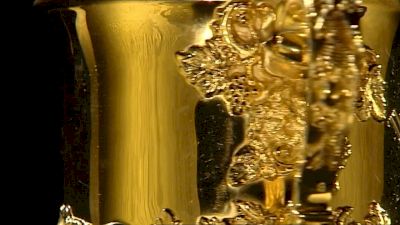
The All Blacks led 24-10 just after half-time when, in the space of 14 minutes, the French pressed the flair button and scored 26 points unanswered, going on to win 43-31. The final, though, was an anticlimax with a tight, disciplined and slightly boring Australian side seeing off the French who seemed to be spent. A second title for the Aussies.
USA: A two-point loss to Romania was heartbreaking, but the USA took one accolade from RWC 1999, as Juan Grobler's try against Australia was the only try the Wallabies allowed all tournament.